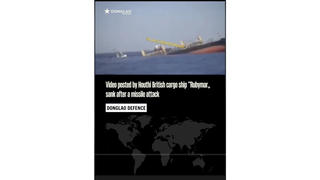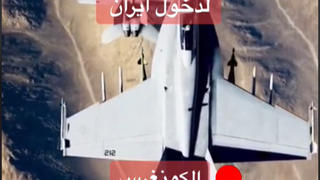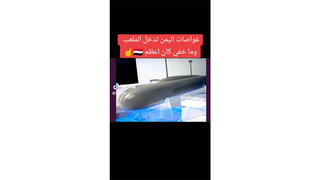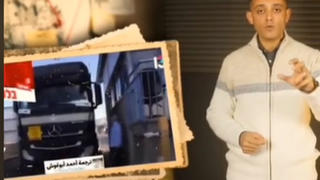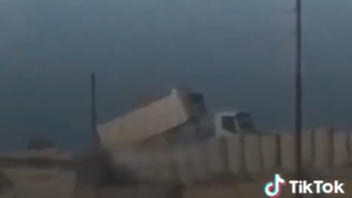
Did Egypt construct a buffer zone on its Gaza border as a precautionary measure to accommodate Palestinians in case an Israeli offensive into Rafah prompts an exodus across the frontier? No, that's not true: Egyptian President Abdel-Fattah el-Sisi has warned that a forced or voluntary Palestinian exodus is a "red line" and that his nation will not allow Palestinian refugees from Gaza into the Sinai Peninsula. Other Egyptian officials said a walled area near the Gaza border, detected by satellites recently, was an outdoor logistics center to ease truck congestion on its Gaza border and facilitate humanitarian aid.
The claim appeared in a video (archived here) on TikTok on February 18, 2024, two days after Egypt categorically denied that the area it is constructing on the Rafah border was meant for Gaza refugees. Egypt asserted that it would be solely used for logistics, to store and transport food, medical supplies, fuel and water overland across Rafah's border. A text overlay (translated from Arabic to English by Lead Stories staff) read:
El-Sisi's regime is a new cancer for the nation.
This is what the post looked like on TikTok at the time of writing:
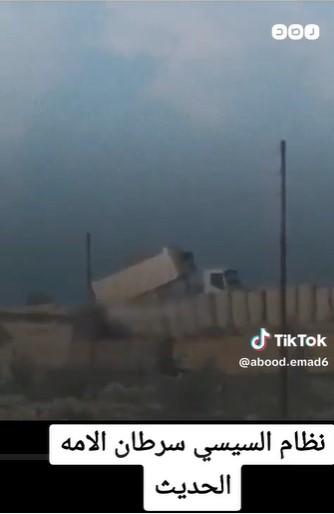
(Source: TikTok screenshot taken on Mon Feb 19 14:27:34 2024 UTC)
Egypt has unequivocally dismissed allegations of participating in any process involving the displacement of Gaza Palestinians into the Sinai Peninsula, its State Information Service (SIS) (archived here) said on February 16, 2024. "Egypt's decisive stance since the beginning of the aggression ... is to completely reject any forced or voluntary displacement of Palestinian brothers from the Gaza Strip to outside it, especially to Egyptian territory," SIS head Diaa Rashwan said (as translated) in a statement posted on his agency's website. He said such a scenario would entail "a definite liquidation of the Palestinian cause and (comprises) a direct threat to Egyptian sovereignty and national security." He pointed out that Egypt has "already had a buffer zone and barriers in this area for a long time before the current crisis erupted," adding that the area under construction will be used as a logistics center to prevent congestion and facilitate the flow of trailers laden with goods into Gaza.
In the wake of the ongoing Hamas-Israel conflict, which erupted on October 7, 2023, some far-right Israeli officials said they favored sending Gaza Palestinians into Egypt's Sinai. But Egyptian Prime Minister Mostafa Madbouly, echoing remarks by el-Sisi, reaffirmed on November 21, 2023, that Egypt flatly rejected the forced displacement of Palestinians in Gaza to Sinai, according to the prominent Egyptian Ahram Online (archived here).
Vice President Kamala Harris also asserted on November 2, 2023, that Washington opposed any forced displacement of Palestinians from Gaza. "Let me be unequivocally clear: The people who have been forced out have a right to return home. And there should be no forced displacement, no forced migration, and that is it," she told a press briefing in remarks posted on the White House's website (archived here).
Speculation on a forced Israeli displacement of Palestinians from Rafah began on February 12, 2024, when Israeli warplanes carried out airstrikes in the densely populated town, where an estimated 1.4 million people had sought refuge from Israeli attacks elsewhere in Gaza. Israel has been seeking the hideouts of the militant Palestinian Hamas, which rules the coastal strip, according to a February 16, 2024, report by AlJazeera news channel (archived here).
The claim that Egypt began to build a walled buffer zone near Rafah to host Palestinian refugees surfaced after major Western news organizations, such as the Wall Street Journal (WSJ) (archived here) on February 15, 2024, the Washington Post (archived here) and the Associated Press (AP) (archived here) a day later, reported that satellite images showed that Egypt was building a walled compound near the Rafah border.
The WSJ said that Egyptian authorities, "fearful that an Israeli military push further into southern Gaza will set off a flood of refugees, are building an 8-square-mile walled enclosure in the Sinai Desert near the border." It wrote the "massive new compound is part of contingency plans if large numbers of Gazans do manage to get in."
The AP said the satellite images, taken by Maxar Technologies on February 15, 2024, show "ongoing construction on the wall, which sits along the Sheikh Zuweid-Rafah Road some 3.5 kilometers (2 miles) west of the border with Gaza." The AP said the images show "cranes, trucks and what appear to be precast concrete barriers being set up along the road."
The satellite images correspond to features seen in a video released by the London-based Sinai Foundation for Human Rights (archived here), a U.K.-based Egyptian opposition group, on February 12, 2024. The video shows a crane lifting concrete walls into place along the road. It said the construction "is intended to create a high-security gated and isolated area near the borders with the Gaza Strip, in preparation for the reception of Palestinian refugees in the case of (a) mass exodus."


